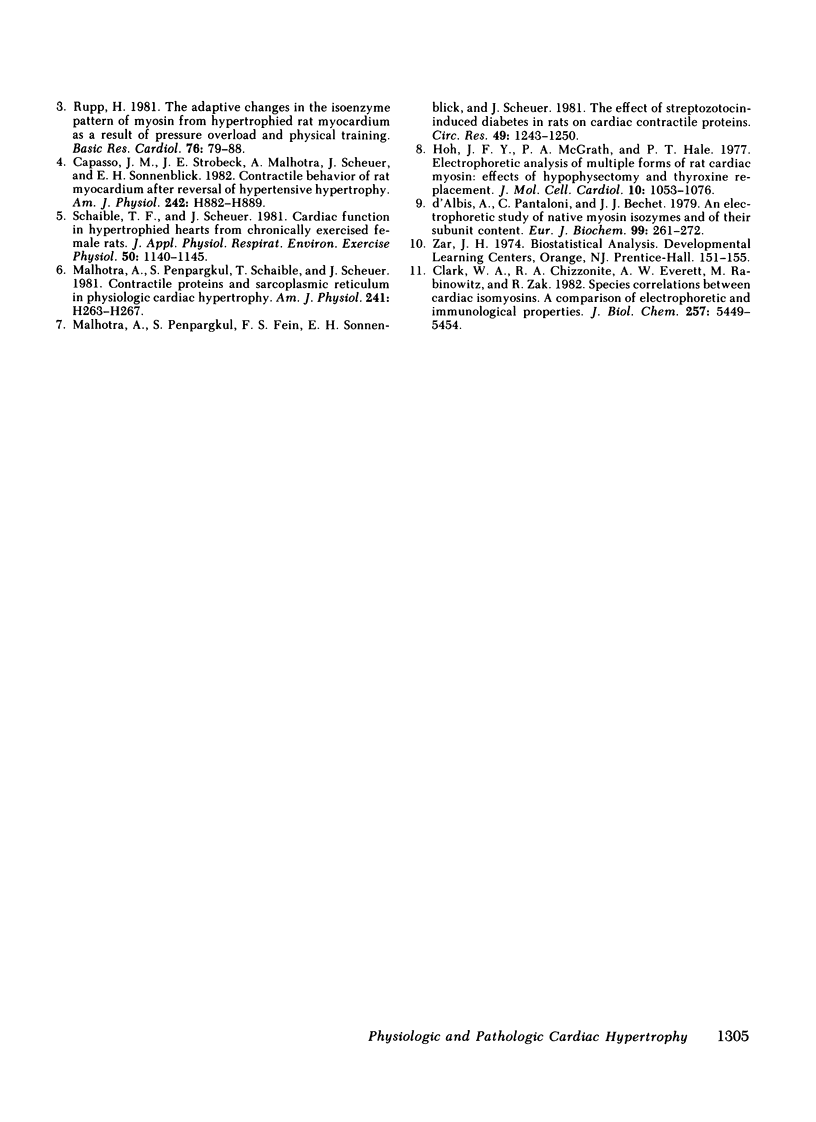Abstract
To evaluate the combined effects of cardiac overload imposed by hypertension and by chronic exercise, male and female rats were made hypertensive by unilateral renal artery stenoses and made to exercise in an 8-10-wk swimming program. Sedentary normotensive animals, sedentary hypertensive animals and normotensive animals exposed to the swimming program were also studied. Hypertension was associated with the development of cardiac hypertrophy, and this was exaggerated in hypertensive swimmers. Actomyosin, Ca2+-myosin, and actin-activated Mg2+-myosin ATPase activities were enhanced in normotensive swimmers, depressed in hypertensives and were normal or increased in hypertensive swimmers. Myosin isoenzyme analysis showed a predominant V1 pattern in normals; an increase in percent V1 isoenzyme is swimmers; a predominant V3 pattern in hypertensives; and a return to the predominant V1 pattern in hypertensive swimmers. These findings suggest that the hypertrophy imposed by hypertension and hypertrophy imposed by physical training using a chronic swimming program are distinctly different biological phenomena. Physical training by swimming prevents the changes in cardiac myosin induced by hypertension despite the exaggeration of hypertrophy.
Full text
PDF





Images in this article
Selected References
These references are in PubMed. This may not be the complete list of references from this article.
- Capasso J. M., Strobeck J. E., Malhotra A., Scheuer J., Sonnenblick E. H. Contractile behavior of rat myocardium after reversal of hypertensive hypertrophy. Am J Physiol. 1982 May;242(5):H882–H889. doi: 10.1152/ajpheart.1982.242.5.H882. [DOI] [PubMed] [Google Scholar]
- Clark W. A., Jr, Chizzonite R. A., Everett A. W., Rabinowitz M., Zak R. Species correlations between cardiac isomyosins. A comparison of electrophoretic and immunological properties. J Biol Chem. 1982 May 25;257(10):5449–5454. [PubMed] [Google Scholar]
- Hoh J. F., McGrath P. A., Hale P. T. Electrophoretic analysis of multiple forms of rat cardiac myosin: effects of hypophysectomy and thyroxine replacement. J Mol Cell Cardiol. 1978 Nov;10(11):1053–1076. doi: 10.1016/0022-2828(78)90401-7. [DOI] [PubMed] [Google Scholar]
- Malhotra A., Penpargkul S., Fein F. S., Sonnenblick E. H., Scheuer J. The effect of streptozotocin-induced diabetes in rats on cardiac contractile proteins. Circ Res. 1981 Dec;49(6):1243–1250. doi: 10.1161/01.res.49.6.1243. [DOI] [PubMed] [Google Scholar]
- Malhotra A., Penpargkul S., Schaible T., Scheuer J. Contractile proteins and sarcoplasmic reticulum in physiologic cardiac hypertrophy. Am J Physiol. 1981 Aug;241(2):H263–H267. doi: 10.1152/ajpheart.1981.241.2.H263. [DOI] [PubMed] [Google Scholar]
- Mercadier J. J., Lompré A. M., Wisnewsky C., Samuel J. L., Bercovici J., Swynghedauw B., Schwartz K. Myosin isoenzyme changes in several models of rat cardiac hypertrophy. Circ Res. 1981 Aug;49(2):525–532. doi: 10.1161/01.res.49.2.525. [DOI] [PubMed] [Google Scholar]
- Rupp H. The adaptive changes in the isoenzyme pattern of myosin from hypertrophied rat myocardium as a result of pressure overload and physical training. Basic Res Cardiol. 1981 Jan-Feb;76(1):79–88. doi: 10.1007/BF01908164. [DOI] [PubMed] [Google Scholar]
- Schaible T. F., Scheuer J. Cardiac function in hypertrophied hearts from chronically exercised female rats. J Appl Physiol Respir Environ Exerc Physiol. 1981 Jun;50(6):1140–1145. doi: 10.1152/jappl.1981.50.6.1140. [DOI] [PubMed] [Google Scholar]
- Scheuer J., Bhan A. K. Cardiac contractile proteins. Adenosine triphosphatase activity and physiological function. Circ Res. 1979 Jul;45(1):1–12. doi: 10.1161/01.res.45.1.1. [DOI] [PubMed] [Google Scholar]
- d'Albis A., Pantaloni C., Bechet J. J. An electrophoretic study of native myosin isozymes and of their subunit content. Eur J Biochem. 1979 Sep;99(2):261–272. doi: 10.1111/j.1432-1033.1979.tb13253.x. [DOI] [PubMed] [Google Scholar]




